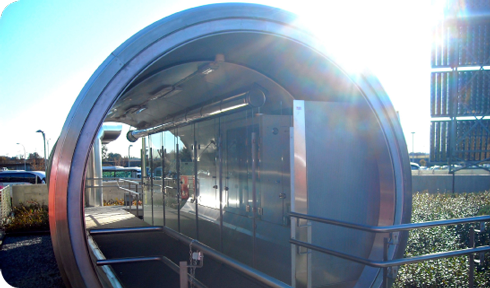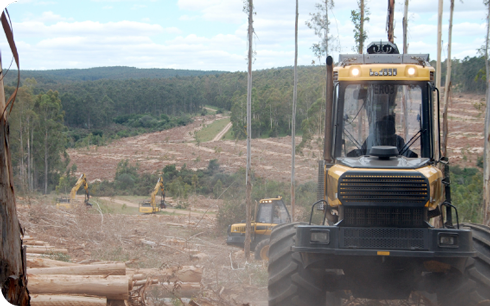 Abengoa
Abengoa
Annual Report 2012
- Activities
- Activities
- Industrial production
- Hydrogen, energy crops and ocean energy
Hydrogen
Due to the financial crisis, many nations and governments have recently lowered their short-term projections for the hydrogen economy. That said, the number of emerging applications and niche markets related to hydrogen and fuel cells is on the up.
For as long as interest remains in the hydrogen economy and with the aim of providing sustainable methods for producing and utilizing this clean fuel, Abengoa has also centered its attention on these niche markets, offering solutions in sectors such as transport, mobile applications and cogeneration through the use of high-temperature fuel cells. It is therefore already focusing on seeking out markets for these technologies.
Abengoa has been able to take part in hydrogen projects in Spain, Holland and other European countries, collaborating with both domestic and international partners.
Our growth strategy rests on a number of cornerstones, such as: investing in research and development on the path to new technologies, forging strategic alliances with benchmark technological partners and agreements with suppliers to develop applications jointly, and performing projects in collaboration with our customers, thus enabling them to incorporate hydrogen and fuel cells into their products as soon as possible.
Abengoa’s work in the hydrogen sector centers primarily on two key areas:
- Producing renewable hydrogen via technologies such as biofuel reforming, integrating renewable energy sources with electrolyzers, and utilizing thermochemical combined cycles with high-temperature solar thermal energy.
- Using hydrogen in fuel cells featuring different technologies, as well as in engines and hydrogen turbines.
Among the main projects for clients, we would highlight the developments made to the airindependent propulsion (AIP) system of the S-80 submarine, which the Spanish shipyard Navantia is developing for the Spanish Navy. Among the company’s self-funded R&D projects, we would single out Procyon, which was started in 2012 with the aim of developing a 300 kV stationary cogeneration plant employing high-temperature fuel cells (molten carbonates), which will be built at Campus Palmas Altas, Abengoa’s headquarters in Seville.

Energy crops
The potential growth of the Uruguayan market remains huge for both Forestry Services and Biomass Trading, with the country boasting a booming forestry sector with growth in both plantations and industry.
On the international stage, we have focused on biomass for producing electrical power, an area in which we have detected major opportunities to expand further as a global biomass supplier.

Our vision is to become the global market leader in the sustainable production and sale of biomass, offering groundbreaking industrial solutions and creating value for our shareholders, customers and employees.
At present the main drive within the country has taken the form of new investments in the cellulose production area (Montes del Plata) and new biomass-to-energy generation projects, providing a further boost to both lines of business.
In the international arena, the need to replace fossil fuels, coupled with changes in the energy matrices of countries dependant on fuel imports, is opening the door to new energy sources, such as biomass obtained from energy crop plantations.
In Uruguay, the company has managed to cement its position of leadership in its two areas of business (Forestry Services and Biomass Trading) and has also established a foothold in the MdP cellulose plant through a goods yard operation agreement, a new area of business offering huge potential.
Internationally, we have generated heavy interest in our projects from some of the leading European electric utilities that consume pellets, and we are confident that a MoU will be signed with at least two of these as the first step towards long-term biomass supply agreements.
Although we have a long haul ahead of us, short-term growth projections look promising.
Forestry services:
- Harvest and extraction.
- Biomass logistics: loading, transport and goods yard operations.
Biomass production and trading worldwide:
- Energy crop plantations.
- Performance of industrial biomass processing projects.
- Biomass trading.
Within this constantly growing market, Abengoa has consolidated its two local forestry business lines and expects growth and profits to gather pace over the coming years.
Looking ahead, the outlook is very bright in these new areas and the company now intends to focus its efforts on capitalizing opportunities to benefit Abengoa as a whole.
Ocean energy
The electrical power generation potential of the oceans is huge, calculated at 93,100 TWh/year, and the International Energy Agency predicts that installed capacity in 2035 will reach 19 GW worldwide.
The current challenge facing the industry is getting past the pilot / demonstration phase. Once this has been achieved, we must make swift progress along the learning curve during commercial operation on the path to generating electricity at costs that prove competitive with those of conventional energy sources and more mature renewable sources, such as wind and solar power.
The main target markets for Abengoa’s ocean energy business are those offering the best quality wave energy resources. The United Kingdom currently leads the way in ocean energy. As well as having one of the planet’s best wave power resources, it also offers at present the best tariff conditions for expanding the industry. Australia could also be an interesting proposition for staging the first demonstration plants.
Also in the picture are niche markets, such as oil & gas platforms, and other unique applications, such as port signaling buoys, scientific marine instrumentation, offshore aquaculture, etc. The use of water desalination devices is another interesting option.
Abengoa’s overriding objective in the field of ocean energy is to cover the entire value chain (technology, promotion, financing, engineering, construction, operation and maintenance) at ocean power parks harnessing the hydrokinetic resource (waves and current).
Abengoa aims to set itself up as an international benchmark for both technology and EPC within the marine energy sector.
Abengoa’s ocean energy division operates out of Spain, but already has a presence -directly or through alliances or agreements with partners- in the United Kingdom, Ireland and the United States.
The company boasts a young and highly dynamic team with considerable experience in other areas of the company. Furthermore, in 2012 Abengoa Seapower recruited a number of specialists to further strengthen its human capital.
2013 will be a key year in setting up and shaping this new business at Abengoa. As well as filling out the initial human team, the company will lay the foundations, through technological / strategic projects and alliances, for:
- Developing a proprietary technology.
- Collaborating on an advanced wave technology concept.
- Acquiring capacities in managing offshore projects.
- Engaging in engineering projects.
- Developing a pipeline of company-specific projects through initial prospection work.

We would highlight the following milestones:
- Development of a collaborative venture with the Irish company Wavebob Ltd. in order to research, develop and market wave power generation systems.
- Conducting work within Nautimus, the first initiative for engineering, procurement and construction (EPC) services to support the development and implementation of wave power and marine current projects alongside the Swedish electrical utility Vattenfall and the British engineering firm Babcock.
Ocean energy business is currently structured into four different activities:
- R&D, developing technology through a host of different programs and alliances, such as the Tecoagua, Genera and Ecoboya projects with public entities and private companies.
- Engineering, in which the company is developing the expertise and know-how required to tackle EPC projects for ocean energy parks and other related offshore ventures in the near future.
- Development, in which we intend to develop our parks of tomorrow.
- Business development, in which we analyze markets and pick out opportunities, helping to develop industry on an international scale.
Fuel cell and hydrogen facility at Campus Palmas Altas (Seville)
Biomass (Uruguay)
New business line specializing in marine energy
© 2012 Abengoa. All rights reserved
